I thought for the final installment of Chasing Amazing’s Daredevil 50th Anniversary month celebration (I’m going to have a very special, non-Daredevil announcement on Wednesday), I’d take a look at what many consider to be one of the greatest Spider-Man storylines of all-time, and one I have shockingly neglected to discuss on this site (until now), “The Death of Jean DeWolff.”
The 1985 arc is, of course, famous for being the one of the very first Marvel comic book stories scripted by Peter David. True to its title, “The Death of Jean DeWolff” centers around the shocking murder of police captain Jean DeWolff, whose brutal death is depicted on one of the very first pages of the arc’s opening issue, Spectacular Spider-Man #107. Spider-Man and Daredevil eventually come together when DeWolff’s killer, a masked hoodlum dubbed the Sin-Eater, goes on to murder a prominent judge and a priest.
There are a few reasons why I’ve never talked about “The Death of Jean DeWolff” on this web site. For one, as unbelievable as this sounds, I only read it for the first time a little more than a year ago. I’ve mentioned how in the past, I have some major “blind spots” as it relates to Spider-Man “B” titles like Spectacular, Web of Spider-Man, etc. I’m working to resolve these blind spots one day at a time, so if I’ve shattered your illusions of me as a Spider-Man fan, hopefully I can win your trust back.
But beyond not having read the arc until fairly recently, I’ve also avoided writing about the storyline because my feelings about it are quite conflicted and complicated. It’s not that I don’t recognize how great of a story “The Death of Jean DeWolff” is – everything about it (Peter David’s writing, Rich Buckler’s art, the drama, the pacing, how every plot-point is tied-up in a neat but realistic way, etc.) is exceptional. And yet I have a hard time accepting “The Death of Jean DeWolff” as a “true” Spider-Man story.
Now what could I possibly mean by saying something as blasphemous as that? Let me attempt to defend myself. Part of “The Death of Jean DeWolff’s” acclaim is the fact that it is an extraordinarily dark and gritty story – unlike anything readers of Spectacular Spider-Man, and arguably all of Spider-Man comics had ever seen. I’m not necessarily talking about the content, though the visual of Jean DeWolff’s blood-covered head laying on the ground in Spectacular #107 is unlike anything I’ve ever experienced in a Spidey comic.
What I’m referring to is the storyline’s tone and overall emotional resonance. Perhaps it’s because David was so new to the world of Spider-Man when this was published, he was focused more on trying to tell a great story rather than focusing on some of the core characteristics of the Spider-verse. Regardless, I can’t help but think “The Death of Jean DeWolff” is a Daredevil comic masquerading as a Spider-Man comic.
So that’s a gauntlet I just threw down, huh? Still, that’s not meant as a slight against this storyline. If anything, it’s high praise. In the late 70s/early 80s, Daredevil was in the midst of one of the most groundbreaking runs in Marvel comics history when the legendary Frank Miller provided scripts and pencils while Klaus Janson supplied inks. Daredevil was on the verge of cancellation when the two came aboard when Miller and Janson transformed the streets of Hell’s Kitchen into a dark and gritty nightmare, filled with criminals, gang wars, homelessness, and other uncomfortable images. Daredevil/Matt Murdock was forced to cope with some awful developments in his life, most notably the return of his college sweetheart Elektra, who takes a job as Kingpin’s assassin (and is later murdered by Bullseye).
As dramatic as these changes ended up being, they are also unquestionably logical and sensible. Daredevil’s defining superhero characteristic is that he is blind and has enhanced senses. So putting him in an environment that is black and despairing to its core like Miller and Janson’s Hell’s Kitchen was a stroke of editorial/creative genius. These stories really played up to the expression, “justice is blind.”
Miller would go on to repeat the trick a few years after his run when he tackled two of the most famous Batman stories of all time in The Dark Knight Returns and ‘Year One.” If you talk to people in 2014 about the core characteristics of the Batman universe, they won’t even blink before telling you about its darkness. As the nickname states, he is the “Dark Knight.” But Miller’s work in the mid-80s is what really shifted the tone of Batman for good. Up until then, there was still some Golden/Silver Age glossiness to the character (how dark can a hero be if there’s visual proof of him playing baseball with Superman and Robin on the cover of World’s Finest Comics?).
Of course, Frank Miller didn’t write “The Death of Jean DeWolff,” but I can’t separate the fact that from my perspective, it clearly influenced David’s work. Is that a bad thing? I would think having your work favorably compared to some of the greatest comic book stories of the past 40 years is a good. But again, is “The Death of Jean DeWolff” a Spider-Man story?
Spider-Man is an interesting case where he has one of the darkest origin stories of any superhero created by Marvel – a teenaged orphan who’s bullied and treated like an outcast is bitten by a spider, gets fantastic powers, and as a result of his own selfishness, his uncle is brutally murdered by the same man he could have apprehended earlier in the story. And yet, when I think of Spider-Man, I don’t think of “darkness.” I think of the overall brightness and splashiness of those Steve Ditko-penciled comic books, where over-the-top characters like the Cheshire-grinning J. Jonah Jameson and villains like Doctor Octopus and the Green Goblin lived. How can a comic be dark if the hero is fighting a guy in a yellow thunderbolt hat like Electro?
If “The Death of Jean DeWolff” had been released 20 years later and took place in Baltimore, the murder mystery element would sound like a storyline direct from HBO’s The Wire. The Spider-verse had mysteries before, but those were mostly benign like “who’s under the Green Goblin mask?” or “is this Mary Jane Watson girl as ugly as Peter fears she is?” Plus, most of Spider-Man’s heroics are typically characterized as being more reactionary than investigative. Doc Ock is trying to take over the world and Spidey tries to stop him. Rhino is rampaging through New York City and Spidey is there to save the day. The Green Goblin captures Spidey and now he has to escape. The shoe leather investigating was normally saved for the likes of Daredevil.
Even the featured villain in “The Death of Jean DeWolff” comes across as being foreign. That’s nothing against the Sin-Eater/Stan Carter as a character. From a storytelling perspective, I love the reveal that a police officer with legitimate emotional issues would become evil and corrupt and go on a murder spree fueled by his own self-righteousness. Adding in the detail that Carter was a former S.H.I.E.L.D. agent helps explain why he is so handy with a shotgun.
But again, when were the police characterized like this before in the world of Spider-Man? This level of double crossing and “don’t trust anyone” had previously been resigned to the world of Daredevil (or Batman). The most significant cop Spider-Man ever had to deal with was Captain George Stacy, the father of his girlfriend, Gwen. There was once a storyline where Captain Stacy committed a crime, but that was because he was brainwashed by the Kingpin. There were a few other cops introduced during the Roger Stern run on Amazing Spider-Man, but none with the complexity of a Stan Carter.
Speaking of Kingpin, David scripts a very eye-opening scene in Spectacular #109 where Spidey checks in on Wilson Fisk and asks him what he knows about the Sin-Eater. The Kingpin assures Spider-Man that the Sin-Eater is not his kind of guy – not because of the murders of DeWolff and the judge, but because of what the criminal did to the priest. Kingpin says that priest killers “polarize cities [which] are [in turn] harder to control.”
This statement gets me every time for so many different reasons. There’s something unquestionably profound about how Kingpin draws the line in the sand about the “right” and “wrong” ways to be a criminal. At the same time, his morality is not based on whether or not murder is a bad thing, but more about how the death of religious leader creates inter-city turmoil and chaos. At the end of the day, Kingpin doesn’t actually sympathize with the priest’s family or the parishioners who lost their spiritual leader. He’s just thinking about himself and how actions like the Sin-Eater’s loosen his vice grip on New York City.
Since I’ve already went ahead and compared “The Death of Jean DeWolff” to Frank Miller’s Daredevil 50 other times in this entry, I might as well go for broke here and say that that David’s Kingpin reads exactly like the version of the character that received a total cerebral makeover by Miller and Janson in the late 70s during their run on Daredevil. As I outlined in my two posts about Kingpin last week, the Spider-Man version of the character was a bit goofier and Bond-villain-esque, while Miller created this shockingly realistic criminal mastermind. Having Fisk soliloquy about how priest killers screw his bottom line feels more in line with Miller than Stan Lee.
Still, everything I brought up to this point are minor quibbles when compared to my biggest issue in calling “The Death of Jean DeWolff” a “Spider-Man story.” After ending Spectacular #109 on one of the best cliffhangers in Spider-Man history (the Sin-Eater aiming his rifle at Betty Brant and firing), Spidey finally gets the satisfaction of confronting the villain and unmasking him as Carter. In a traditional Spider-Man story, Spidey would web up Carter and crack a few jokes at his expense as the cops carried him away. But that’s not what happens in Spectacular #110.
Spider-Man starts to wail on Carter. And then he wails on him some more. And then he really starts to lay into this guy, who might be somewhat physically augmented as a former S.H.I.E.L.D. agent, but he’s certainly not super powered. It gets so bad that Daredevil interferes, trying to pull Spidey off so he doesn’t do anything he regrets. That’s when Spider-Man and Daredevil fight each other for a few pages before cooler heads ultimately prevail.
It’s explicitly established in this storyline that if Daredevil did not interject, Spidey would have killed Carter. More importantly, it didn’t appear that Spidey cared if he killed Carter. Even during the aftermath, there was never that definitive “what was I thinking?” moment from Spider-Man, akin to what we got during his famous battle with the Green Goblin in Amazing Spider-Man #122 (after the Goblin killed his girlfriend Gwen, to boot).
What David does in this scene is humanize Spider-Man, but in a far different way when compared to what we’ve seen with this character in the past. Carter has deceived Spider-Man during his quest to brutally murder the pillars of a functioning society – law, security, spirituality, etc. So when viewing this through the prism of relateable human reactions, Spider-Man’s rage and righteousness is justified.
But Spider-Man isn’t your average, every day person. Remember, this is the hero who follows the mantra, “with great power, must also come great responsibility.” I know some of you will defend David’s characterization by reminding me that Spider-Man is not a saint – he has killed and caused harm to others, sometimes intentionally. My response to that is I find the bulk of those stories (all half dozen of them) to be outliers. What Spider-Man does to Carter in “The Death of Jean DeWolff” is one of the most calculated and brutal beatdowns I’d ever seen him administer (David even went on to highlight the ramifications for Stan and Spidey in “The Return of the Sin-Eater” arc). So while Spidey’s actions might seem justified in isolation, how can we possibly elevate this as one of the greatest Spider-Man stories ever, when it seemingly gets one of the core characteristics of the titular character so wrong?
Interestingly enough, after all of these upside down character choices, David ends this epic on a note that feels more familiar than anything else in this arc. The big status quo shift introduced by this storyline (beyond Jean’s death) is that Daredevil uses his heightened senses to determine Peter is Spider-Man and in return, he reveals his secret identity to Spidey. Watching these two heroes put aside their differences and relate to each other is a “true” Spider-Man comic book moment.
So now that I’ve likely alienated a portion of my readership that puts this storyline on the tippy-toppest of pedestals, let me reiterate one more time that I think “The Death of Jean DeWolff” is one of the best comic book stories I have ever read. That doesn’t change the fact that I still can’t reconcile it as a Spider-Man story.

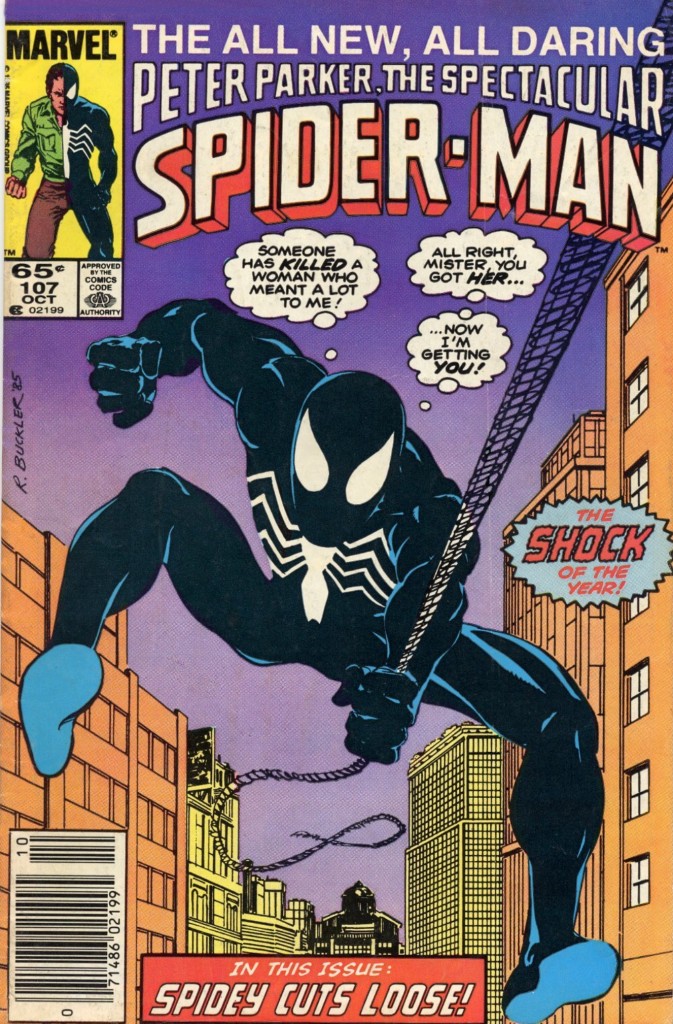
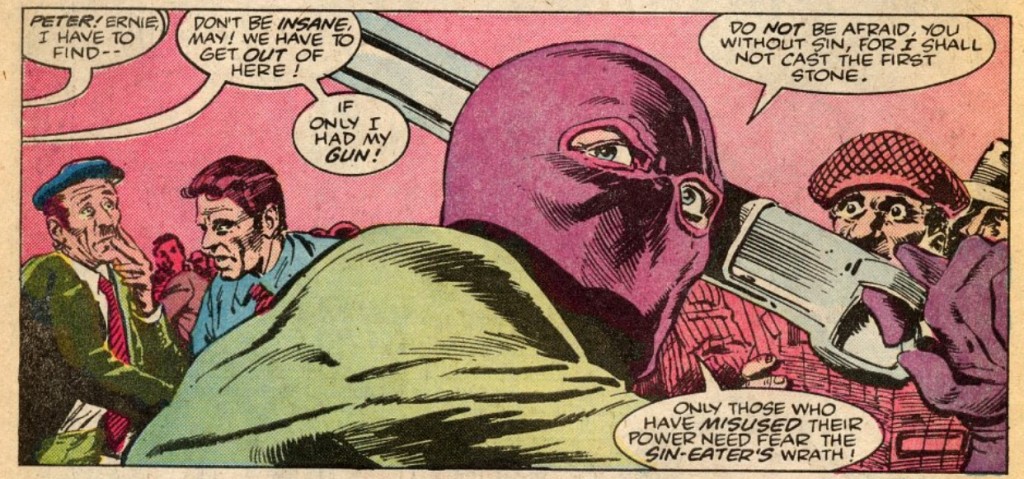
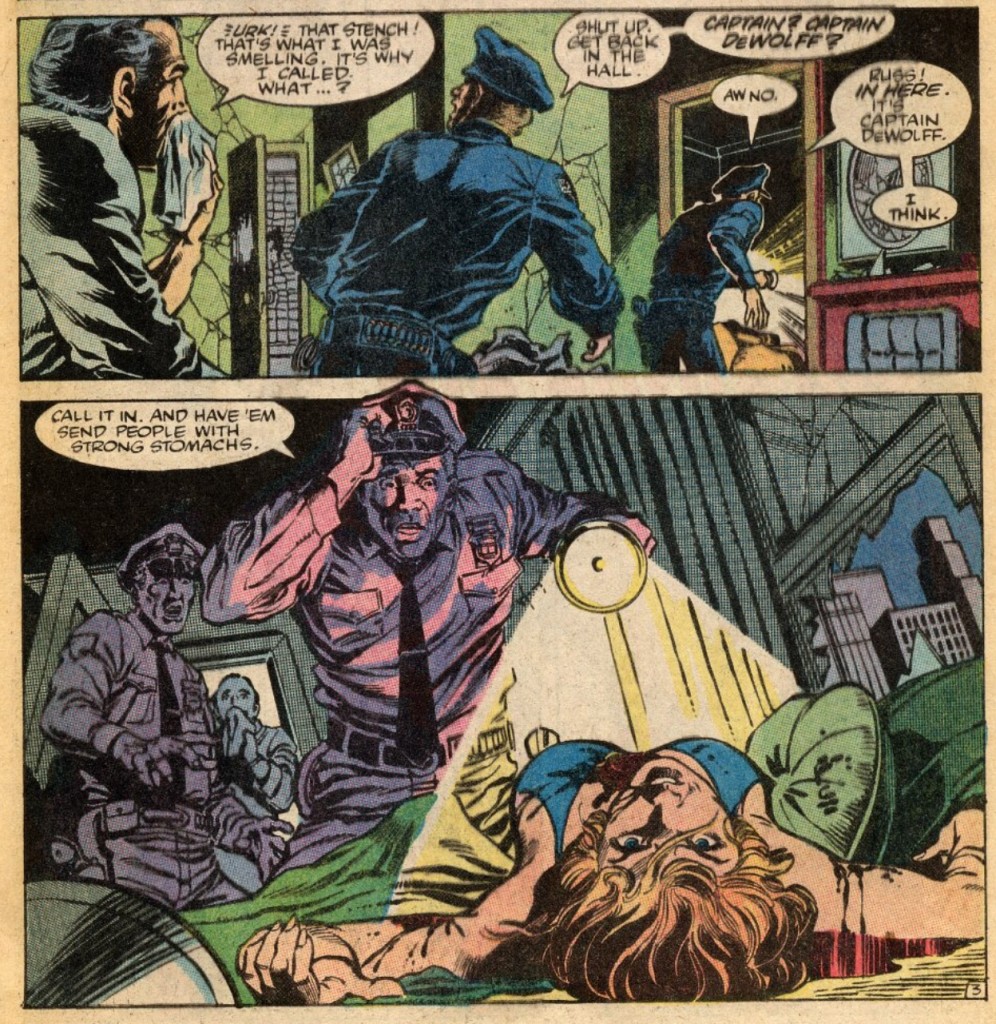
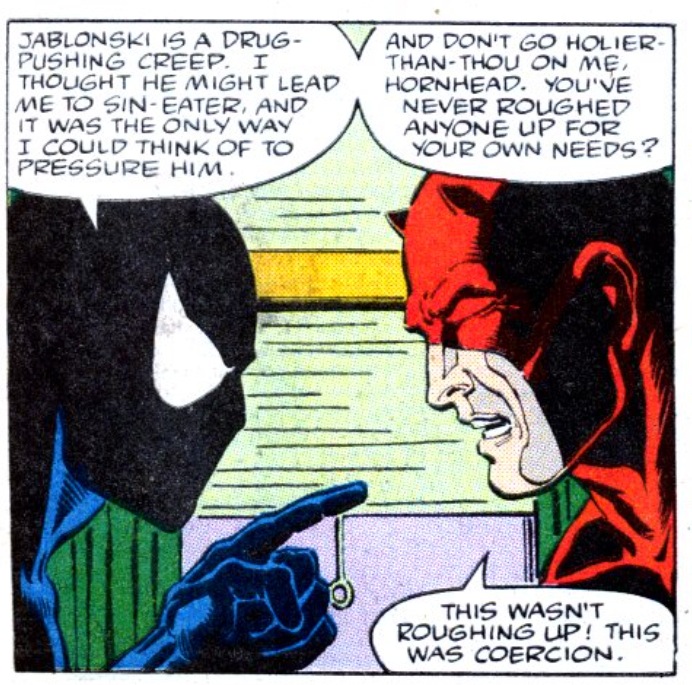
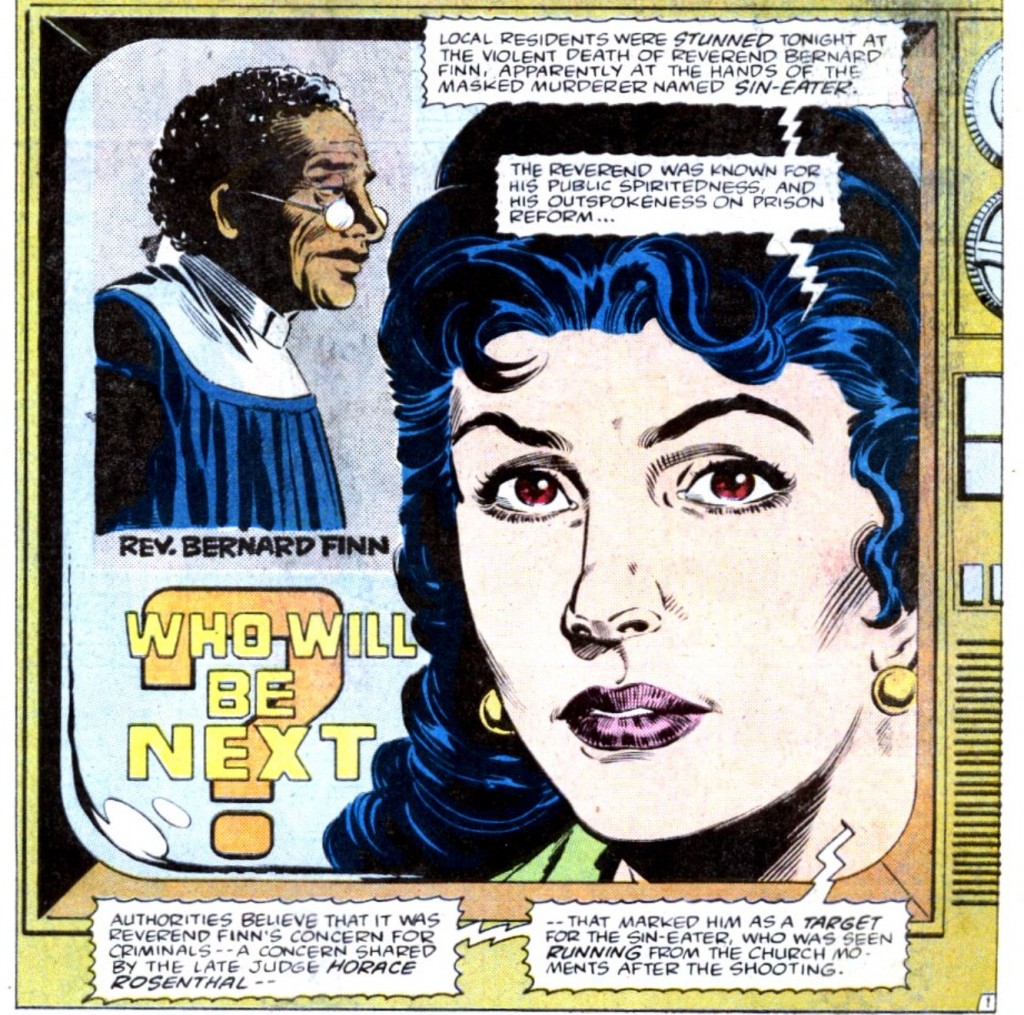
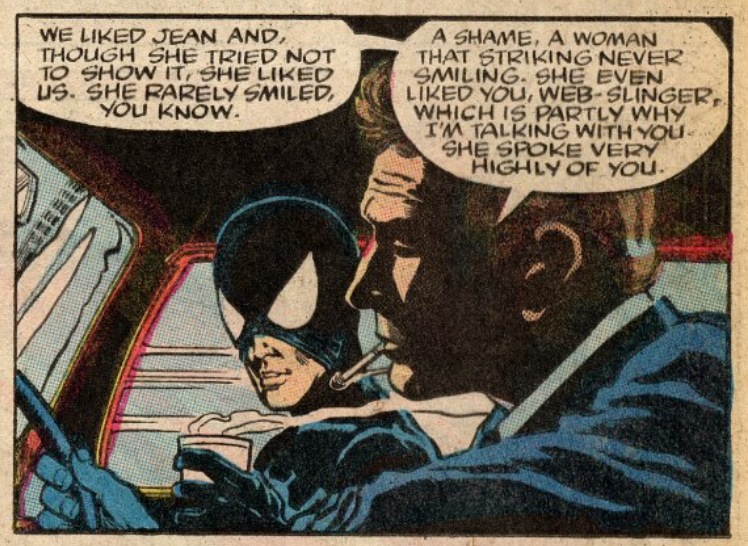
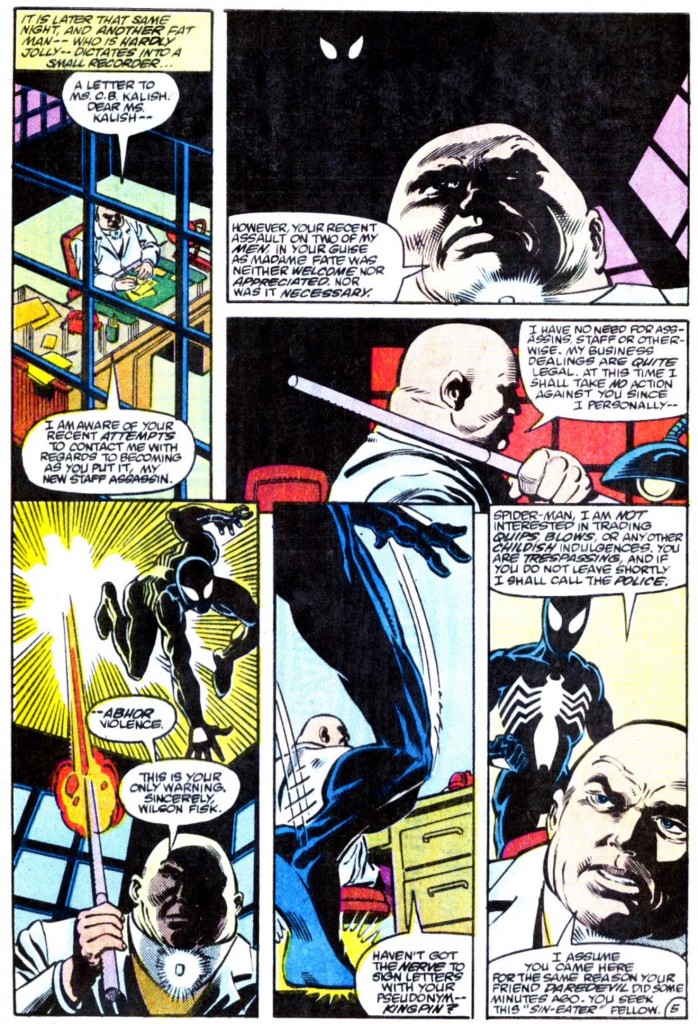
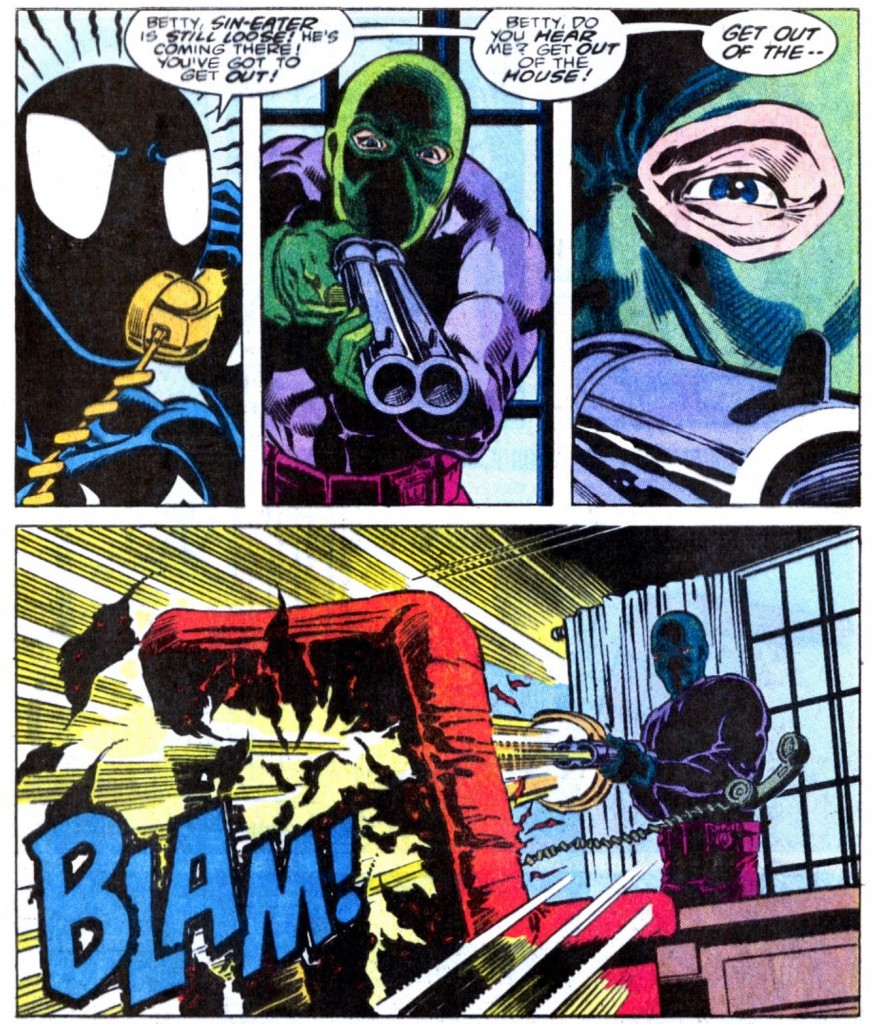
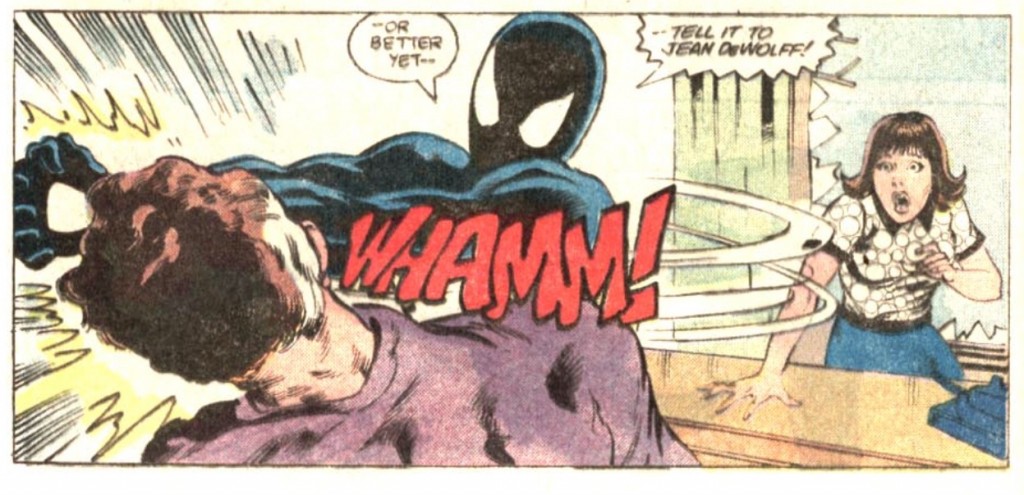
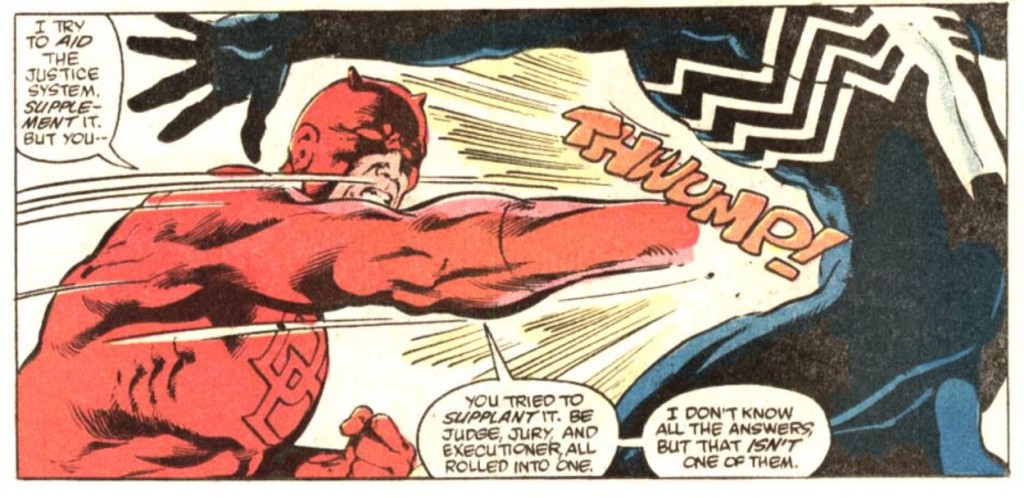
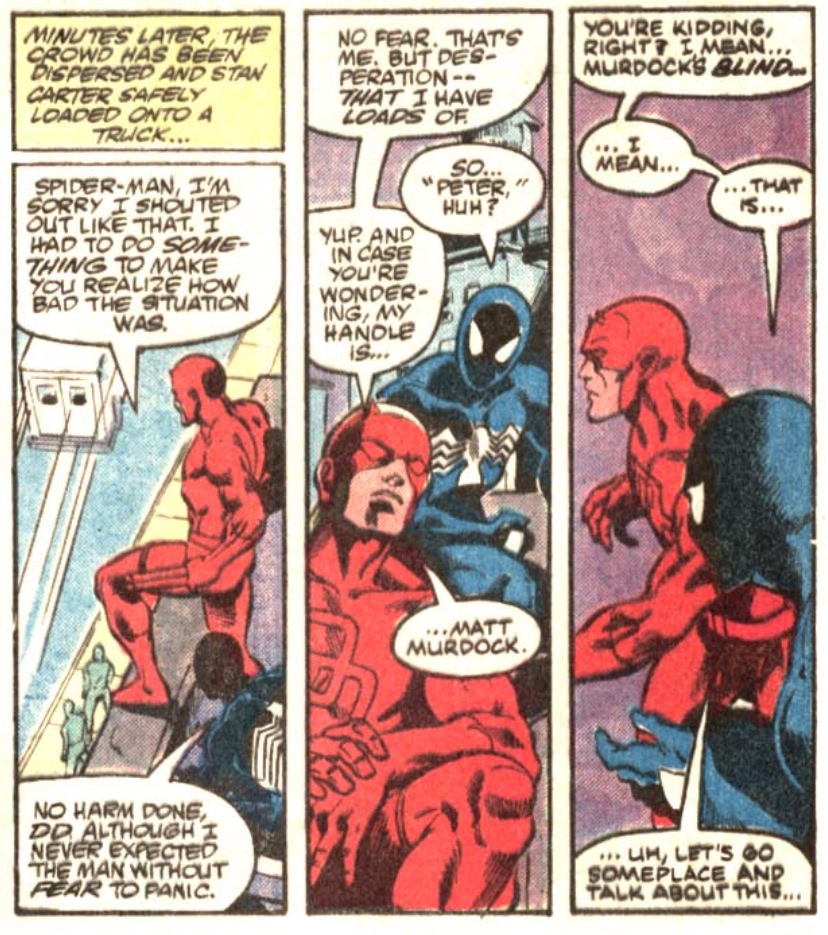

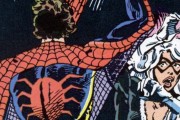
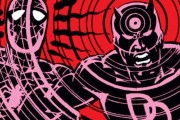

I tend to lump “Death” and “Kraven’s Last Hunt” together, but not because of their surface similarities. Rather, they’re both excellent stories that work as well as they do specifically because they “aren’t” Spider-Man stories. They leave more of an impression specifically because they’re unique, injecting a different genre into the Spideyverse. On the other hand, I can totally see how that would be, if not alienating, at least a bit off-putting when it comes to reconciling them into the larger tapestry of Spider-Man stories.
It reminds me of a conversation I recently had at my LCS. Liz Allen’s behavior in the recent “Superior” conclusion highlighted an often-overlooked aspect of the Spider-Man mythos: everyone will tell you that Spider-Man has one of the strongest supporting casts in comics, and they’d be right. But what’s seldom mentioned is how completely damaged Peter’s circle of friends are, or at least, could be portrayed as if chosen. Liz, Flash, Betty and Norah spring to mind as having some serious issues, but really, almost every cast member has undergone some serious trauma or tragedy.
Despite this, Spidey is generally an optimistic character specifically because he and his friends persist in the face of such horror. Sometimes, the adversity you triumph over is stopping a slobbering black-suited maniac, but sometimes it’s something as legitimately ugly as “Death”. That’s why I’d argue it works as a Spidey story, albeit in an “exception that proves the rule” fashion.
I actually just re-read this a month ago (along with the follow-up with Electro, etc). I’m totally on board with what you say here– the depiction of Peter is so un-Peter, ya know?
I kind of want to dig up some of the issues surrounding it in this run for some more context, but I always walk away with two things from the whole story:
1. I love the return of Sin-Eater as a symbol of guilt for Peter’s actions.
2. This isn’t a story I’d recommend to Spider-Man fans – he seems like a player in another’s story here.